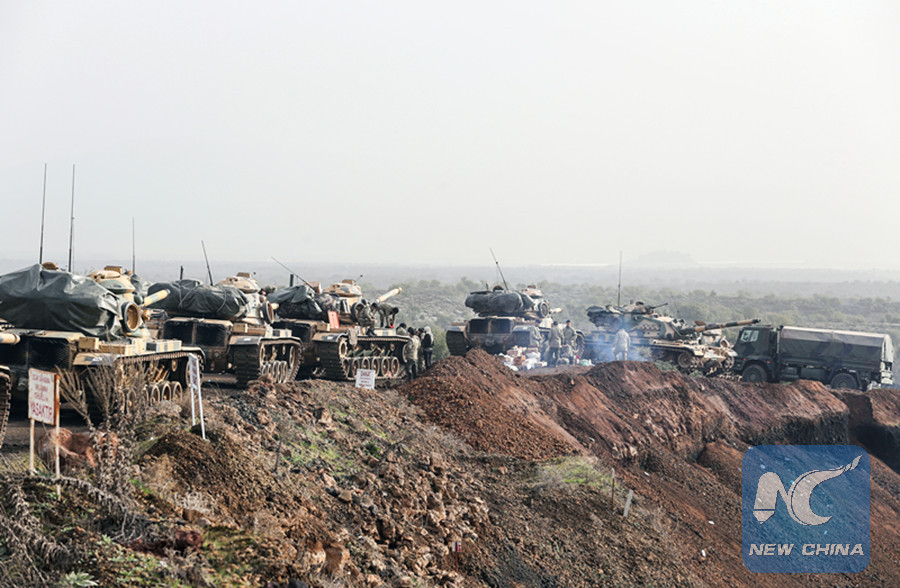
Turkish army tanks were seen in Afrin, Syria, on Jan. 22, 2018. Turkey launched on Jan. 20 "Operation Olive Branch" on the ground to oust Kurdish militia from Syria's Afrin. (Xinhua)
ISTANBUL, Jan. 31 (Xinhua) -- Turkey is not expected to expand its ongoing military operation in Syria to target the U.S.-backed Kurdish militia in Manbij, so to avoid the risk of a military conflict with the U.S., analysts said.
Turkey would not take such a move since it cannot run the risk of a clash with the U.S., given the balance of military power and current circumstances, Cahit Armagan Dilek, head of the Ankara-based 21st Century Turkey Institute, told Xinhua.
Turkish troops, backed by the rebel Free Syrian Army, are fighting in Afrin in northwestern Syria in "Operation Olive Branch" launched on Jan. 20 to drive out the Kurdish militia, known as the People's Protection Units (YPG).
Ankara sees the YPG as the Syrian offshoot of the outlawed Kurdistan Workers' Party (PKK) which has been fighting for an autonomous Kurdistan in Turkey's predominantly Kurdish southeast.
After Turkish President Recep Tayyip Erdogan vowed to target Manbij to the east of Afrin in the next move, Foreign Minister Mevlut Cavusoglu on Saturday asked U.S. troops to withdraw from the town immediately.
In response, Joseph Votel, commander of the U.S. Central Command, vowed on Sunday that the U.S. was not considering withdrawing its troops from Manbij.
U.S. President Donald Trump, in a phone call with Erdogan last Wednesday, also warned about the risk of a possible clash between the two NATO allies if Turkish troops refuse to limit its operation in Syria.
Hasan Koni, a professor of public international law at Istanbul Kultur University, said that both sides may be bluffing in a sort of chicken game to see who would finally back away.
Ankara has long been angry at Washington over its continued arming of the Kurdish militia, which has carved out three autonomous cantons during the Syrian war, with one in Afrin and the other two on the eastern part of the Euphrates River.
Noting that Erdogan lately said the Turkish army would advance on Idlib, Dilek said the Turkish leader may indicate that the Turkish troops will not target Manbij as planned.
"God willing, we will advance on Idlib," Erdogan said unexpectedly on Saturday. Idlib, which borders Afrin, is largely under the control of radical Islamist rebel groups.
Turkish forces have set up several observation posts to monitor a ceasefire in Idlib based on a deal with Russia and Iran, under which four deescalation zones were established inside Syria.
Despite the tensions in his ties with the U.S., Koni said Erdogan may still be thinking about possible cooperation with Washington.
Erdogan said last week that Ankara was hopeful for cooperation with the U.S. in the ongoing Afrin operation, which Turkey describes as a move against terrorism.
"That means Erdogan still keeps the hope of working with the U.S.," said Koni, who did not completely rule out a Turkish military operation against Manbij on the grounds that the Turkish government may act unpredictably.
Turkey changed partners on the Syrian theatre in 2016 after which it has been mainly cooperating with Russia and Iran, staunch supporters of the Syrian government, instead of the United States.
Ankara has often accused Washington of not keeping its promise to withdraw the YPG from Manbij, about 130 km east of Afrin.
Noting that Votel takes orders directly from the White House, Dilek said his remarks about the U.S. refusal to withdraw troops from Manbij should be seen as Trump's answer to Erdogan.
In response to a question on whether the U.S. is concerned about an armed confrontation with the Turkish army in Syria, a Pentagon spokesman said Monday that measures were being taken to prevent such an eventuality and that Turkey knows where the U.S. forces are.
Another Pentagon spokesman said the only U.S. partner in Manbij is the Manbij Military Council, with 60 percent of its members being the Arabs and the remaining 40 percent the Kurds.
Ankara argues, however, that the YPG is the dominating force within the U.S.-backed militia in Syria. The Pentagon is aiming to nullify Turkey's demand by creating the impression that local people are governing themselves in Manbij and that the YPG is not in charge, said Dilek.
Koni, like many others in Turkey, believes that Turkey may be seeking to carve out a Sunni area along the Syrian-Turkish border for the Free Syrian Army to rule.
Turkey sees the emergence of a YPG-controlled belt along its border as a major national security threat, fearing such an entity would set a precedent for its own nearly 20 million Kurds.
Maintaining it is now almost too late and risky to settle the issue militarily, Dilek suggested that Turkey work out a way of neutralizing the YPG threat without risking an armed confrontation with the U.S.

